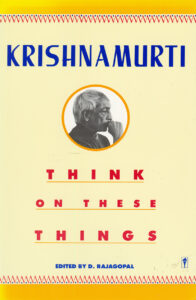Think On These Things
By Jiddu Krishnamurti (1895 - 1986), edited by Rajagopalacharya Desikacharya (commonly D. Rajagopal) (1900–1993).
258 Pages | Copyright 1964, first Perennial Library Edition 1970, reissued 1989 | Sofcover | Harper Perennial - A Division of Harper Collins Publishers, New York | ISBN: 0060916095.
Whether writing about a conversation with someone, or describing a sunset, or giving a public talk, Krishnamurti seems to have a way of addressing his remarks, not just to his immediate audience, but to anyone, anywhere, who will listen; and there are many, all over the world, who are eager to listen. For what he says is without bias, and universal, and in a strangely moving way reveals te very roots of our human problems.
The material contained in this Volume Think on These Things (Dutch translation: Denk daar maar eens over) was originally presented in the form of talks to students, teachers and parents in India, but its keen penetration and lucid simplicity will be deeply meaningful to thoughtful people everywhere, of all ages, and in every walk of life. Krishnamurti examines with characteristic objectivity and insight the expressions of what we are pleased to call our culture, our education, religion, politics and tradition; and he throws much light on such basic motivations as ambition, greed and envy, the desire for security and the lust for power - all of which he shows to be deteriorating factors in human society.
From Chapter 3 - 'Freedom and Love' (p. 19):
" To be free we have to revolt against all inward dependence and we cannot revolt if we don't understand why we are dependent. Until we understand and really break away from all inward dependence we can never be free, for only in that understanding can there be freedom. But freedom is not a mere reaction. Do you know what a reaction is? If I say something that hurts you, if I call you an ugly name and you get angry with me, that is a reaction - a reaction born of dependence; and independence is a further reaction. But freedom is not a reaction, and until we understand reaction and go beyond it, we are never free. "
’ ‘Krishnamurti’s observations and explorations of modern man’s estate are penetrating and profound, yet given with a disarming simplicity and directness. To listen to him or to read his thoughts is to face oneself and the world with an astonishing morning freshness.’"-- Anne Marrow Lindbergh
 Bezig met bijwerken...
Bezig met bijwerken...